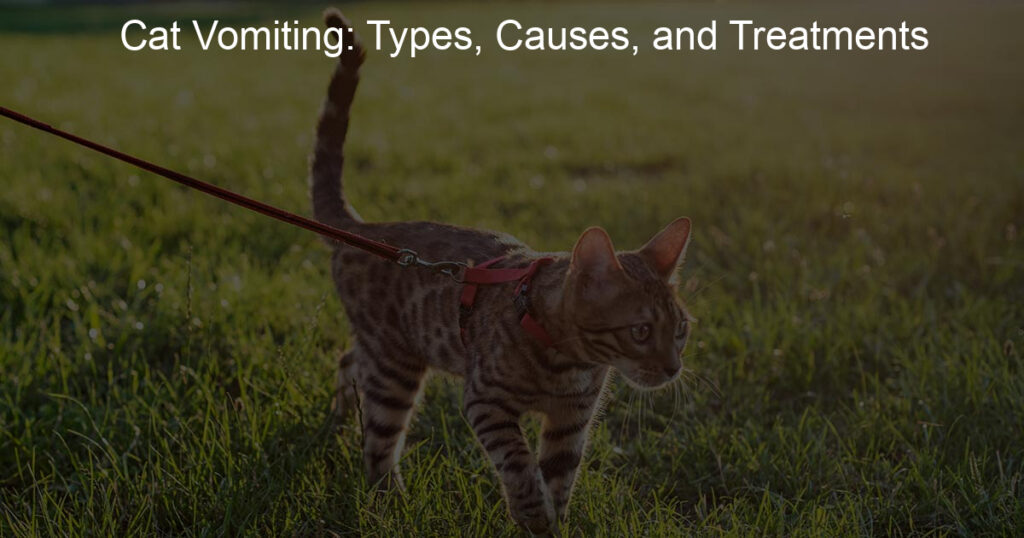Are you a pet lover who loves cats but needs help dealing with one of their “less desirable” habits – vomiting? Don’t worry, you’re not alone! Vomiting is commonly experienced by cats for all sorts of reasons, both normal and potentially problematic.
So in today’s blog post, we’ll dive into the various types of cat vomiting, potential causes, and some helpful treatments to get your furry feline back on track. You don’t need to keep your head stuck in the litter box feeling helpless any longer; read on to learn some easy tips that will surely come in handy!
What is the most common cause of vomiting in cats?
For cat owners, understanding the most common cause of vomiting in cats can be a vital tool in maintaining the health and well-being of their feline friends. The answer might surprise you! While anything from overeating to food allergies can contribute to vomiting, one of the most frequent causes is hairballs.
Cats naturally groom themselves by licking their fur, but for longhaired breeds, this can create issues.
Hair clumps together and accumulate in the stomach over time, leading to digestive discomfort and eventually resulting in vomiting. The easiest way to keep your cat healthy and prevent vomit issues is to groom them regularly – ideally brushing them every day – so you can rid them of excess fur before it leads to issues.
What is the treatment for cat vomiting?
Cat vomiting can be a sign of health issues, so it’s important to get your beloved kitty looked at by a vet. Once a diagnosis is determined, the treatment for cat vomiting depends on the underlying cause. In many cases, dietary changes or medications can be prescribed to help treat the symptoms and manage the condition.
If ingestion of something toxic or foreign material is found to be the culprit, then removal may be necessary via surgery depending on the severity. Ultimately, finding an effective way to treat cat vomiting requires getting professional help first and foremost – don’t hesitate to book that appointment!
What home remedy can I give my cat for vomiting?
If your cat is vomiting, it’s important to pay attention to the underlying cause so that you can properly address the problem and help your feline friend. While some more severe issues might require a vet visit, there are some home remedies you can give to your cat for vomiting.
One of those remedies is a mixture of equal parts white rice and boiled chicken or lean beef, which will help settle an upset stomach. You can also try providing extra hydration with a small amount of diluted Gatorade and peristaltic elixir, which helps increase water intake.
Additionally, things such as ginger root and slippery elm can also be useful in calming down an agitated bowel. Just keep in mind when giving home remedies to cats that they should be administered under supervision and with guidance from a professional if needed.
When should I be concerned about my cat vomiting?
When it comes to keeping your cat healthy, there are a few key things to look out for and one of those is vomiting. While it’s not uncommon for cats to vomit from time to time due to an upset stomach or eating something they shouldn’t, it’s important to be aware of how often your cat is vomiting, as well as what might be causing them to do so.
If your cat is vomiting more than once in 24 hours or has blood in their vomit then you should schedule a visit with the vet right away to make sure everything is okay. Usually, vomiting will pass in a day or two and isn’t anything serious – but it’s better to be safe rather than sorry!
What do different types of cat vomit mean?
Vomiting– it’s not something cats enjoy any more than humans do. But cat owners need to make sure they attend to their pet’s vomiting, as the type and frequency of vomit may indicate different problems that your furry friend is facing.
Hairballs indicate an over-grooming problem that should be addressed; yellow bile can be a sign of a dietary issue; and if your cat is throwing up food shortly after eating, it may have ingested something poisonous. Keeping an eye on what your cat throws up can help you better identify and treat any potential underlying issues your feline companion might be dealing with.
What illnesses make cats vomit?
Vomiting is a common symptom for cats, often caused by several illnesses, including food sensitivities and reactions, digestive disorders, cancer, poisoning from toxic substances or plants, pancreatitis, and kidney disease.
Some of the more serious illnesses that can cause vomiting in cats are infections of the gastrointestinal tract with bacteria or parasites, intestinal blockages due to foreign objects, inflammatory bowel disease, and hyperthyroidism.
In all cases where your cat is vomiting frequently, it is important to have them seen by a vet as soon as possible for testing and diagnosis so that proper treatment can be provided. Doing this will help keep your furry friend healthy and free from discomfort.
Final Takeaways
All in all, cat vomiting can be an unpleasant and stressful experience for any pet parent, but fortunately for us, there are usually ways to work through it. It is important to remember that vomiting is simply a symptom of another issue, and seeking medical treatment can help identify the cause and provide your cat with the best care.
Furthermore, many cat vomiting problems can be avoided through prevention such as providing regular check-ups, maintaining proper nutrition, and avoiding exposure to toxins. Most importantly, if your cat is exhibiting any of these signs or symptoms of vomiting, never hesitate to take them to the vet straight away so that it can get the necessary treatment quickly and return to good health!












